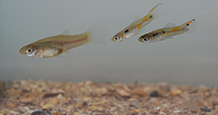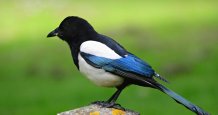Psychology news archive 2019

Killer whale grandmothers boost survival of calves
Post-menopausal killer whale grandmothers improve the chances of survival for their calves, new research has found.

Close friends help macaques survive
Close friendships improve the survival chances of rhesus macaques, new research shows.

Leadership’s in the blood for tiny fish
Leadership during cooperation runs in the family for tiny fish called Trinidadian guppies, new research shows.

Body language key to zoo animal welfare
Watching the behaviour and body language of zoo animals could be the key to understanding and improving their welfare, new research suggests.

Zoo animal research skewed towards ‘popular’ species
Research on zoo animals focuses more on “familiar” species like gorillas and chimpanzees than less well known ones like the waxy monkey frog, scientists say.

Flamingos tickled pink by revamped exhibit
Flamingos at the Oakland Zoo are at their flamboyant best thanks to scientists at the University of Exeter.

Tickets available for free, family-friendly weekend event in Bude
A spectacular weekend of sound, light, music and art will bring together regional and international artists to explore the connection between coastal living and wellbeing.

The middle aged are lonelier than older and younger people
Middle-aged people are lonelier than older adults and young people, new research suggests.

Empathy for perpetrators helps explain victim blaming in sexual harassment
Men’s empathy for other men who sexually harass women may help explain why they are more likely to blame victims, new research suggests.

Best male biathletes ‘more attractive’
Top male biathletes are more attractive to the opposite sex, according to a new study by scientists at the universities of Exeter and Bristol.

Flamingo expert wins zoo research award
A University of Exeter scientist has won a gold award for his research into the nocturnal behaviour of flamingos.

Online brain game helps you eat less meat
If you want to live a healthier life and help save the planet then the science points to eating less meat.

Psychologists target root cause of soil erosion
Psychologists might hold the key to reducing soil erosion that wrecks pasture land belonging to the Maasai tribe in Tanzania.

Some songbird nests are especially vulnerable to magpie predation
A new study has revealed a range of factors that cause a variation in predation by magpies on farmland songbirds.

Call for artists for commission on how coastlines benefit mental health
Artists are being invited to bid for a commission to take part in an innovative project that will combine science and the arts to explore mental health, starting at the Cornish coast.

Nutritional supplements cannot prevent depression, research shows
A daily intake of nutritional supplements won’t help stave off the onset of depression, a new study has revealed.

MDMA users more empathetic than other drug users
Long-term MDMA users have higher levels of empathy than cannabis and other drugs users, new research suggests.

Being kind to yourself has mental and physical benefits, research shows
Taking time to think kind thoughts about yourself and loved ones has psychological and physical benefits, new research suggests.

What do coffee, work-outs and a vivid imagination have to do with bipolar disorder?
Drinking tea or coffee, exercising and imagining events are things that most of us do sometimes, but they might tell us more about how people with bipolar disorder can manage their condition.

Exeter psychologist receives prestigious award for Research in Traumatic Brain Injury
A leading Clinical Neuropsychologist from the University of Exeter has received a prestigious award for his work.

The mental health pros and cons of minority spaces in the workplace
Dr Christopher Begeny, Postdoctoral Research Fellow in Social and Organizational Psychology at the University of Exeter, writes for the Conversation UK
